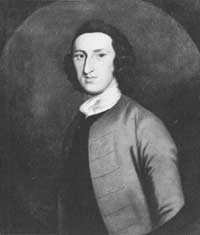William Livingston
| William Livingston | |
|---|---|
 |
|
| 1st Governor of New Jersey | |
|
In office August 31, 1776 – July 25, 1790 |
|
| Preceded by |
William Franklin as Royal Governor |
| Succeeded by |
Elisha Lawrence Acting Governor |
| Personal details | |
| Born |
November 30, 1723 Albany, Province of New York, British America |
| Died | July 25, 1790 (aged 66) Elizabeth, New Jersey, U.S. |
| Resting place | Green-Wood Cemetery, Brooklyn, New York |
| Spouse(s) | Susannah French |
| Children | 13 |
| Parents |
Philip Livingston Catherine Van Brugh |
| Relatives |
Philip Livingston (brother) Robert Livingston (grandfather) Pieter Van Brugh (grandfather) John Jay (son-in-law) John C. Symmes (son-in-law) |
| Alma mater | Yale College |
William Livingston (November 30, 1723 – July 25, 1790) served as the Governor of New Jersey (1776–1790) during the American Revolutionary War and was a signer of the United States Constitution.
Livingston was the son of Philip Livingston and was born in Albany in the Province of New York. Livingston received his early education from local schools and tutors. At age 14, Livingston was sent to live for a year with an Anglican missionary among the Iroquois Indians in the Mohawk Valley. He enrolled at Yale College upon his return in 1738 and graduated in 1741. He went on to New York City, where he studied law and became a law clerk for James Alexander and William Smith.
He was admitted to the bar in 1748 and began his practice in New York City. In 1752, along with William Smith and John Morin Scott he founded a weekly journal, the Independent Reflector. The Reflector was New York's first serial non-newspaper publication and the only one being published in British North America at the time. It was used as a platform for challenging the powerful De Lancey/Anglican faction, most notably over the founding of King's College. Publication of the Reflector ceased with the fifty-second issue after political pressure was brought to bear upon its printer, James Parker. Livingston served one term in the New York Assembly, but he remained politically active in its affairs until his political allies lost power in 1769.
In 1770, he moved to Elizabethtown (today Elizabeth, New Jersey), where he built a large country home to house his growing family. The house, known as Liberty Hall, still stands today. After attaining considerable influence amongst the local patriots, Livingston was elected to serve as one of New Jersey's delegates to the Continental Congress. He served from July 1774 to June 1776. In October 1775, he was commissioned a brigadier general of the New Jersey Militia.
...
Wikipedia
